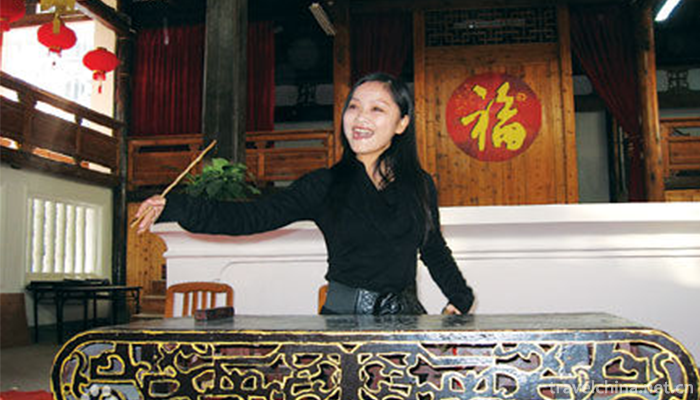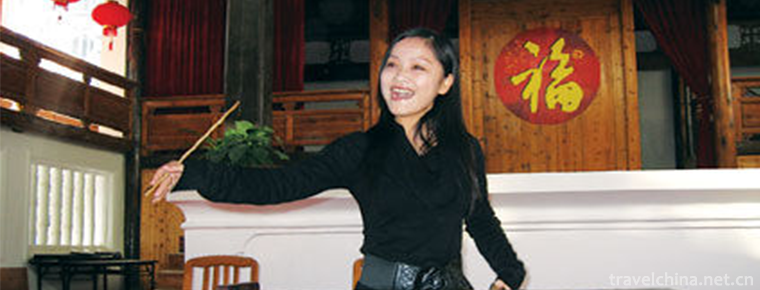Fuzhou Reviews
Fuzhou Reviews
Fuzhou dialect commentary is a unique traditional form of storytelling in Fuzhou dialect of Fujian Province, which is popular in Fuzhou, Fujian Hou, Yongtai, Changle, Lianjiang, Fuqing, Minqing and other counties and cities of Fujian Province, as well as in Fuzhou, where overseas Chinese from Taiwan Province and Southeast Asia live.
On May 20, 2006, the opera was approved by the State Council and listed in the first batch of national intangible cultural heritage list.
Historical origin
It is popular in Fuzhou, Fujian Province, Gutian and Nanping, and it is spoken and sung in Fuzhou dialect. Legend has it that Liu Jingting, a famous Southern Jiangnan storyteller, refused to descend to Qing Dynasty and rushed south to Fujian. He taught his disciples to sing in Fuzhou dialect and commented on the current situation through historical stories, gradually forming a unique style of talking and singing. In ancient times, it was usually on a narrow street. One person said that the audience was sitting in the streets and alleys.
The commentators are mostly one person. They don't need makeup or scenery. They can perform with a cymbal, a wake-up wood, a paper fan, a handkerchief and a high platform with a table. It pays attention to singing, speaking, doing and flowers, and the lyrics are mostly seven words. It often uses dozens of music cards, such as "a flower", "dripping gold", "wave washes sand", "festival height". Taoist language is vivid and popular, with distinct personality. During the performance, the lyrics alternate with the speech, the melody is graceful and melodious. Through facial expressions and body movements, the characters and story plots are highlighted, and the atmosphere is strengthened by cymbals knocking and waking wood hitting the table. "Flowers" refer to gimmicks in performances, in which the bony flower highlights jokes in characters and plots to achieve comic effects; flower arrangement is the intersection of small jokes unrelated to the story. The subjects of Fuzhou's commentary are rich and varied, such as "Chang Jie" (historical story), "Short Interpretation" (martial Arts legend), the books of emperors and ministers, the books of public court (official case), family books, etc. Traditional repertoires are not less than thousands of copies, but also compiled some modern themes, such as Nine Deaths, Old Fisherman's Fighting the Enemy and so on.
There are few historical records about Fuzhou commentary. Only in the late Tang and Song Dynasties did the imperial clans and scholars of Central Plains migrate to Fujian many times, including storytellers. Nancun Dropping Farming Record describes that Qiu Jishan, a famous Linan storyteller, tasted a lecture in Fuzhou at the end of Song Dynasty and the beginning of Yuan Dynasty. Song Dynasty's "poetry praise is speech" inherits the popular style of lecturing, that is, to recite "poetry praise" at the beginning, then turn to the "honest words" of the clip chant, and finally to "end stage chant" with poetry praise, and to "fan sounding cymbals" as an interlude. Fuzhou regional commentary still inherits this form. According to the artists'reputation, Fuzhou commentary was formed in the late Ming and early Qing Dynasties, and artists worshipped Liu Jingting as their ancestors. According to legend, Liu Jingting's great disciple Ju Fu-chen went to Fuzhou Shuangmen Tower to teach apprenticeship and handed it down. Judging from the surviving edition of "Seven Stars White Paper Horse" in Yongzheng and Qianlong years of Qing Dynasty, Fuzhou commentary was very popular at that time. The traditional Fuzhou dialect script was first written between Yongzheng and Qianlong in the Qing Dynasty. In Guangxu, Xuantong and the early years of the Republic of China, the good storytellers were Shuangmen Da (Xu Bingquan), the good storytellers were Houzhou Qing (Ruan Qingqing), Xu Tianding, the good storytellers were family storytellers (Huang Juting), Xu Tiansheng, Xiao Xid (Lin Xiaodi), and the embroidery monk (Lai Desen) adapted the film into a modern bibliography. The artistic form tended to emphasize on the multi-chanting and little white way. Table, increase the expression action. There are also two-file counterparts and female commentaries, and a number of bibliographies reflecting local news facts and folklore have been accumulated. Such as "Yishun elder brother candlestick", "Wang Lianlian Baixiang" and so on. In the 1930s, there were nearly 300 people engaged in commentary in Fuzhou. Artistically, marked by Chen Chunsheng, Huang Tiantian and Huang Zhongmei, they have reached a certain height in script structure, singing tone, arrangement of jokes (making flowers), expression and action, and underdressing art (a method of oral re-creation).
Fuzhou commentary has a patriotic tradition. Before and after the Qing soldiers entered Fujian, the commentary artists knocked half cymbals, implying that rivers and mountains were broken and happy. Because of the implied intention of opposing the cruel repression of the Qing army in the stories, a group of artists were labelled in Wengcheng, Fuzhou, and even blinded. After the Opium War, there was a wave of propaganda against smoking and praise of Lin Zexu. During the 1911 Revolution, there was a preface to "Welcome Mr. Sun Yat-sen to Fujian". During the War of Resistance Against Japan, the commentary circles produced a large number of anti-Japanese prefaces, organized anti-Japanese drama clubs and toured to perform anti-Japanese civilized drama. Huang Zhongmei and others gave a half-hour performance of "lecture" before giving a big book. They reported and analyzed the war situation with the language skills of commentary, which was welcomed by the masses.
In the early days of the founding of the People's Republic of China, Fuzhou commentator's preface and modern commentary welcomed liberation and sang new life. Fuzhou commentator's association was established. It participated in the study course of opera reform jointly organized by the Provincial Literary Federation, the Provincial Opera Reform Commission and the Fuzhou Cultural Department, studied Mao Zedong's literary and artistic thought and the Communist Party's opera policy, and self-taught to eliminate reactionary and obscene programs. Rong, compiling modern books. Fuzhou Quyi Troupe was established in 1960, and a number of artistic talents emerged, such as Chen Changzhi, Wu Letian, Su Baofu, Ye Shentong, Huang Yiqing, Mao Qinming, Tang Zhangwen and the woodlands, Chen Ruyan, Wang Qiuyi and Wei Huizhen, which grew up in the 1980s.
Inheritance significance
Fuzhou Commentary has great historical and cultural value in terms of the shape of accompaniment instruments, the way of recitation and performance, the unique genre of music and the traditional topic of the text. It is called the "living fossil" of ancient folk art. However, the contemporary survival and development of Fuzhou commentary are facing great difficulties, which need to be vigorously supported and protected.
The state attaches great importance to the protection of intangible cultural heritage. On May 20, 2006, the opera was approved by the State Council and listed in the first batch of national intangible cultural heritage list.
Famous figure
Chun Sheng Chen
Comments, with singing, facial expressions, and story plots to shape the characters, his performance of chivalrous and unfortunate women, paintings, shape and spirit have, he is on the stage talking and laughing, natural, humorous, he uses the comic factors of character, language, comic factors, forming a funny burden, this funny burden shakes unconsciously. He became famous in the 1920s. After the founding of New China, he set up schools with students, trained the famous "first seven sons and the last seven sons", and created a regional school.
Huang Tian Tian
He is a fastbook of Fuzhou's commentary. His lips are very fast. He is characterized by rough and bright, but he is fast and tasty, fast and not messy. His teacher was Xiao Xiaodi, one of the eight steps hall. At that time, Xiao Xiaodi was talking about gifted scholars and beautiful women. Xiao Xiaodi wrote Lin Zexu Gong Case. Huang Tiantian handed down this commentary. Later, Huang Tiantian turned to martial arts, which formed his unique style.
Huang Zhong Mei
Huang Zhongmei, who rose in the 1930s, was a famous artist. During the War of Resistance Against Japan, he used the form of a newspaper to comment on Fuzhou. All of a sudden, he became popular in Fuzhou. He used the language skills of comment to propagate current events to the masses and make comments on current events. He combined current events with comment, and spoke to the common people in very popular language and art of comment.


-
1.Canton Tower
Located in Guangzhou Haizhu District (Yizhou Island) near the Chigang Tower,
Time 2018-10-12 -
2.Serdang snow mountain Xiling snow mountain
Xiling Snow Mountain, located in Dayi County, Chengdu City, Sichuan Province, is only 95 kilometers away from Chengdu, with a total area of 483 square kilometers. It is a world natural heritage
Time 2018-10-30 -
3.dongjing music
Dongjing music is a very ancient traditional instrumental music, which originated in Sichuan Province in the Song Dynasty and is now popular in Sichuan Province
Time 2019-04-28 -
4.Production Techniques of Black Tea
Qimen Black Tea is the only black tea among the top ten famous teas in China. It is produced in Qimen County, Anhui Province. Tea production in Qimen has a long history, which can be
Time 2019-05-03 -
5.Leting drum
Music Pavilion Drum is a representative form of traditional music drum book and drum music in northern China. It is widely spread in eastern Hebei, Beijing, Tianjin and northeastern Liaoning, Jilin, H
Time 2019-05-11 -
6.Leizhou song
According to the records in historical books, Leizhou songs were prevalent as early as the Song Dynasty. After the 1990s, people divided Leizhou dialect into different rhymes to express different cont
Time 2019-05-11 -
7.Legend of Xu Fudong Du
Xufu Dongdu legend is one of the local folklores in Cixi City, Zhejiang Province and Xiangshan County. It originated from the story that Qin Shihuang sought immortality and Xu Fu sought immortality bu
Time 2019-07-08 -
8.Bamboo carving
Bamboo carving, a traditional folk carving art, uses bamboo roots to carve characters and animal and plant images, or carves characters and pictures on bamboo materials and bamboo utensils. Usually al
Time 2019-08-10 -
9.Bowang mountain
Bo (B ó) Wang mountain, also known as Bowang mountain. Bowang mountain is one of the most important breeding and living places of the ancient Bo nationality. It was known as lunzhudadun and shitoudazhai in ancient times
Time 2020-10-16 -
10.Tiantai Mountain in Qionglai
Tiantai Mountain Scenic Area in Qionglai is located in the southwest of Qionglai City, the hometown of Wenjun. It is the habitat of Sichuan Giant Panda. It is 110 km away from Chengdu City and 45 km away from Qionglai.
Time 2020-11-05 -
11.Mianyang tertiary industry
In 2019, the added value of the tertiary industry in Mianyang will increase by 9.4%, 0.9 percentage points higher than the average level of the whole province. Among them, the added value of wholesale and retail industry increased by 9.5%, transportation
Time 2020-12-14 -
12.Nanchong location
Nanchong City is located in the northeast of Sichuan Basin, in the middle reaches of Jialing River, between 30 ° 35 ′ N ~ 31 ° 51 ′ N and 105 ° 27 ′ ~ 106 ° 58 ′ E. With a span of 165 km from north to South and 143 km from east to west, it is adjacent to Dazhou
Time 2020-12-17